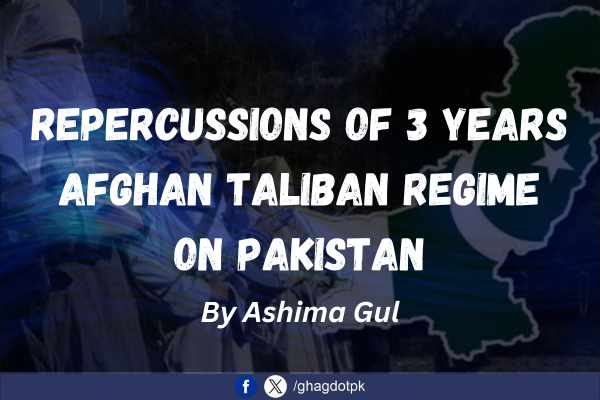By Ashima Gul
“When the neighbour’s house is on fire, yours is not safe either.”– An Afghan proverb
Rise in Cross-Border Terrorism
The Taliban’s return to power in Afghanistan has directly impacted Pakistan’s internal security. The Tehrik-i-Taliban Pakistan (TTP) has significantly increased its operations, launching a surge in attacks. This resurgence has intensified violence, particularly in Khyber Pakhtunkhwa and Balochistan, leading to a substantial increase in casualties among civilians and security personnel. According to the Pakistan Institute for Peace Studies (PIPS), the TTP has been responsible for a significant number of attacks in Pakistan since the Taliban’s takeover. Notably, the number of terrorist attacks in Pakistan has posted a phenomenal increase of 73% during the first 21 months since the Taliban seized power in Afghanistan, compared to the corresponding period before their takeover.
Border Security Challenges
The porous, 2,670-kilometer-long Durand Line, the international border between Afghanistan and Pakistan, remains a significant security challenge. Despite Pakistan’s efforts to fence the border, cross-border infiltration continues. Smuggling of weapons, drugs, and illegal crossings by militants have persisted, complicating Pakistan’s border management and increasing security threats.
Impact of Refugee Influx on Security
The number of Afghan refugees has increased significantly in recent years, especially after the Taliban takeover in 2021. According to the United Nations High Commissioner for Refugees (UNHCR), there were approximately 6.4 million Afghan refugees worldwide as of the end of 2023. Pakistan remains the main host country for these refugees. Refugee camps have become potential breeding grounds for extremist activities due to inadequate resources and oversight. This raises concerns about the recruitment of refugees by militant groups like the TTP.
Increased Drug Trafficking and Organized Crime
Afghanistan remains the world’s largest producer of opium, and the Taliban’s control has seen an uptick in drug production. Drug trafficking from Afghanistan to Pakistan has surged since the Taliban’s 2021 takeover, fueled by weakened counter-narcotics efforts, Afghanistan’s economic crisis, record opium production (a 32% increase in 2022), and the porous border between the two countries. This has led to increased drug seizures (e.g., a significant rise in heroin and morphine seizures), the emergence of new drug types, and severe societal consequences, including rising drug addiction and crime. The Anti-Narcotics Force (ANF) of Pakistan has reported an increase in drug-related arrests, highlighting the growing challenge of combating narcotics and related security issues.
Diplomatic and Intelligence Challenges
Pakistan’s diplomatic efforts to manage its relationship with the Taliban have been fraught with challenges. The Taliban’s failure to curb the activities of the TTP and other militant groups operating against Pakistan has strained relations. Additionally, the lack of formal international recognition of the Taliban government complicates intelligence-sharing efforts and cross-border cooperation.
Three years into the Taliban’s rule, Pakistan faces an increasingly complex security environment. Despite these challenges, Pakistan’s security forces have shown resilience and determination in combating cross-border terrorism, managing the refugee influx, and addressing drug trafficking. However, the situation demands continued vigilance and cooperation with regional and international partners to stabilize the security environment. By strengthening its counter-terrorism strategies, enhancing border security, and fostering diplomatic efforts, Pakistan can mitigate the threats emanating from Afghanistan and ensure a safer future for its citizens.






